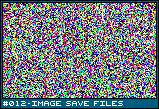|
Mechanic #012 - Image Save Files |
 | Posted: 05/20/07
Save certain data in image format to allow for easy sharing of saved data on the internet. |
A simple idea today. The idea is that data can be embedded into image files (similar to a bar-code, but not having to pander to a single horizontal line scanner) in order to make sharing of data easier.
Images are the easiest thing to share on the internet. Nearly every form of internet community allows for images, from email to the web to web forums. Even if you don't have your own server to host the image, you can enlist the use of something like ImageShack to host it for you. Saving images is also easier and safer than binary data, and the compression can be built in through the image format type. There is also usually an image browsing system available for most operating systems with thumbnail views for quick sorting and browsing.
![[image-data.png]](set01/img/entry012-image-data.png)
Images also encapsulate the data in a visually distinct way. In this example, a save file for an RPG character (presumably that has been built up and customized to your liking) can have an image of that character and various stats as part of the representation. Maybe not this example exactly, but something like it could be attractive enough to use as an avatar. Or perhaps you could share a whole collection of characters in your sig.
I have no idea how much data you could theoretically store in a standard avatar-sized or sig-sized image, but I image that it's probably enough for many different uses. Here are a couple ideas:
- It could be used to share levels created with a level editor, like puzzles for Lode Runner or something similar. It could come with an image of the level itself.
- An image could hold your created deck for a collectable card game. When you go to play against somebody else via a web page, you can just copy and paste the image for your collection and deck to be immediately available.
- It could be a collectable piece of data itself. For instance, if you had a procedural dungeon generator, you could have a single image represent some element, like a type of monster, room, or treasure, and just visually drag and drop the images into the generation pool. You could perhaps even create your own mini-plug ins and distribute them through images so that distribution becomes easier and quicker than something like FilePlanet.
- You could break up complex data into multiple images, number them, and then hide them around a website as sort of an easter egg hunt. The potential players would need to locate all of them and put them together to get the full data. For added effect, have each image also show part of a larger image, so it becomes like putting together a puzzle - a data puzzle.
- It could simply be a typical save file. With the encapsulation of the surrounding image, information about the file could be visually represented, making the process of going through your save files less trial and error and more like flipping through a rolodex.
Submitted by Voltrael
I believe that embedding data within pictures is already done. It's supposed to be one of the ways that data gets transferred covertly using open internet channels (such as something spies or terrorists might do.)
|
The idea isn't to hide data, but to encapsulate it into an easily shared image with extra pertinent visuals making the file easy to identify, browse, and know what's in it. It's similar to how some people have signatures with what MMORPGs they've been playing recently, only this would have actual game data in it, so you could share user created levels or scripts the same way.
This idea is about easier identification and sharing of game data. The bar-code thing is just the implementation, not the idea itself. |